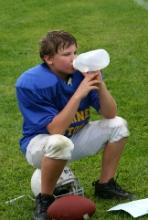
Myths abound about the ability of children to exercise in the heat and about what they should drink before, during and after sports to stay hydrated. Here are the top five heat illness and hydration myths about children.
Myth #1: Youth can't handle the heat as well as adults
Fact: Researchers previously suggested that children were less effective in regulating body temperature, put more strain on their cardiovascular system, and had a lower tolerance for exercise in the heat compared to adults.
Contrary to previous thinking, children are not especially vulnerable and can handle the heat just as well as adults.
Myth #2: Youth are more susceptible to heat stroke than adults
Fact: The truth is that children are at risk for heat illnesses, but they are not more at risk than adults.
In fact, children may be at less risk of heat stroke because they stop, while exercising in the heat, before they enter the "danger zone." Children tend to become grumpy, whiny, and tired when exercising in the heat.
As long as we, as adults, listen to a child's complaints and realize the child is telling us something, then the child has probably avoided a dangerous heat illness.
Myth #3: Youth with heat stroke don't sweat
Fact: A common myth is that heat stroke victims don't sweat so that people have come to depend on the absence of perspiration as their main way to recognize a heat stroke. As a result, if an athlete is sweating, his distress may be mistakenly believed to be some other kind of heat illness.
This is truly a myth, and a dangerous one at that.
The truth is that the majority of heat stroke victims are sweating when they collapse. The body's cooling mechanisms are still working, even in an athlete who has suffered heat stroke. The body is still trying to cool itself through evaporation (sweating) and conduction/convection (red/flushed looking skin). Indeed, it is the rare heat stroke event that involves a victim who has stopped sweating. It typically occurs in very young children or the elderly when left in place without air conditioning.
The bottom line: depend on other symptoms to recognize heat stroke.
Myth #4: Youth should only drink water during and after exercising in the heat
Fact: Research has shown that when children are given only water to drink, they will actually allow themselves to become dehydrated. Even when water is freely given, and a child can drink all he wants, he still voluntarily dehydrates.
On the other hand, when a child is given a flavored drink with electrolytes (a typical sports drink), she will actually avoid becoming dehydrated by drinking 90% more. If a child likes to drink water, give the child water. But if a child does not like water and wants a sports drink, offer one to drink during and after exercising in the heat. A sports drink will not upset their stomachs nor "weigh them down" in any way.
Be careful, however, not to give your child a specialized sport drink designed for endurance athletes; they are meant for athletes who exercise for more than 3-4 hours at a time and need higher amounts of salt in their drink. Children do not need this specialized type of "endurance formula."
Myth #5: Youth shouldn't drink caffeinated beverages during sports
Fact: A recent study debunked the myth that caffeine can cause someone to become more dehydrated and reduce their tolerance for exercising in the heat. As a result, parents don't need to worry that if their child drinks a caffeinated soda, he will become more dehydrated than athletes on the opposing team who don't.
This is NOT to say the drinking of caffeinated beverages (soda, iced tea etc.) should be encouraged: they have a high sugar content, they induce an increase in heart rate, they lack nutritional value, and they do not contain electrolytes (sodium and potassium) needed to replace what has been lost through sweat while exercising in the heat.
In addition, some report that children will not drink as much soda to replace fluid losses as they will if they are offered a sports drink or water. So, while the consumption of soda before, during, and after exercise isn't something to be encouraged, a child can drink a soda if they wish without affecting their ability to handle the heat.



